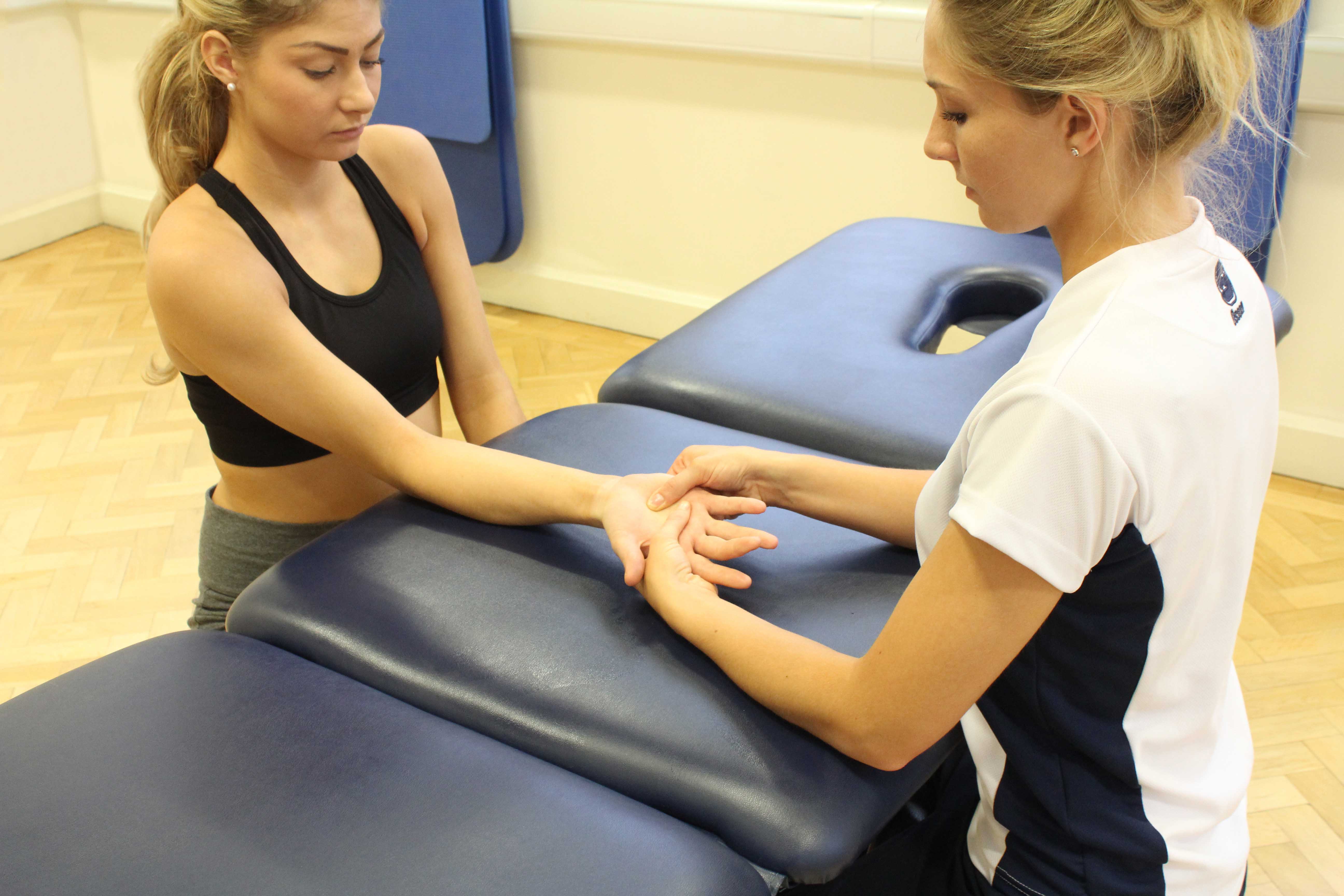What is a Dupuytren’s contracture?
Dupuytren's contracture is a condition affecting the hands and fingers.
Initially the tissues under the skin on the palm of the hand become thickened. As the disease progresses the fingers may start to bend in towards the palm and are unable to be fully straightened. The ring finger is normally affected first, followed by the little finger and then the middle finger making it difficult to do activities such as dressing and writing. The condition develops over many months or years.
 Above: Therapist soft tissue massage of the metacarpals and connective tissues in the hand
Above: Therapist soft tissue massage of the metacarpals and connective tissues in the handWhat can cause a Dupuytren’s contracture?
In the majority of people with Dupuytren's contracture there is no known cause. It has a tendency to run in families and is more common in northern Europe. It is also commonly seen in people with diabetes, epilepsy, and alcohol dependence - but most people with Dupuytren's contracture do not have any of these other conditions. Dupuytren’s contracture is more likely to affect people men over the age of forty although the reason for this is unclear. It is not due to your type of job, vibrating tools, manual work, or other working environments. It is possible that a previous injury to the hand may lead to Dupuytren’s contracture if this has not healed successfully.
What are the symptoms of a Dupuytren’s contracture?
Dupuytren's contracture is not usually painful. The main problem is reduced function. If one or more fingers become contracted, you cannot use the affected hand properly and this will affect you ability to carry out your normal activities of daily living. You may notice lumps and dimples on the palm of your hand which can interfere with you using this hand. As the Dupuytren’s contracture progresses, you may find that you will no longer be able to extend your fingers fully which will make it difficult to carry out simple movements and activities. Other symptoms of Dupuytren’s contracture include: Some people with Dupuytren's contracture also have some thickened tissue under the skin in other parts of their body. For example, the knuckles, on the soles of the feet, or on the penis.
What should I do if I have a Dupuytren’s contracture?
If you notice any of the symptoms described above, it is important that you seek medical help as soon as possible. You doctor or a hand specialist will then be able to assess the area and tell you the exact problem. If the Dupuytren’s contracture is very severe, you will probably be advised to have surgery to try and regain some of the hand’s function. There are two main types of surgery used to treat Dupuytren’s contracture; a fasciotomy and a fasciectomy. A fasciotomy involves cutting the connective tissue to reduce some of the tension in the area whereas a fasciectomy is a complete removal of the connective tissue and this procedure is used for more severe contractures.
What shouldn’t I do if I have a Dupuytren’s contracture?
If you are finding it difficult to perform what used to be relatively simple tasks with your hands and notice any of the symptoms of Dupuytren’s contracture, you must not ignore it. The longer the condition is left untreated, the more likely it is to progress and stop you maintaining an active lifestyle. Even if the disease is not severe and you do not need surgery, it is still beneficial to begin a physiotherapy programme to help maintain your hand’s range of movement and strength.
Physiotherapy for a Dupuytren’s contracture.
After your surgery, it is important to begin a personalised physiotherapy programme to improve the function in your hand and reduce the risk of post-operative complications. Physiotherapy will concentrate on increasing your strength and range of movement with an exercise programme and reducing any swelling or pain with cryotherapy (ice) and compression. It is also important to ensure that the scar is healing effectively and becoming more mobile which will be helped with electrotherapy techniques and frictions. Other physiotherapy treatments include:
- Wax therapy
- Soft Tissue Treatment
- Massage
- Proprioceptive Exercise
Can a Dupuytren’s contracture in the hand have any long-term effects?
If you do not have treatment for the Dupuytren’s contracture, the disease will progress and this could lead to long term complications including stiffness and permanent deformities. Following surgery, there may be temporary complications that have occurred during the operation such as damage to local nerves and blood vessels but this should resolves within several weeks. Physiotherapy will help to minimise the risk of lasting problems following your operation.
To arrange a physiotherapy appointment call Physio.co.uk on 0330 088 7800 or book online.

 0330 088 7800
0330 088 7800





































